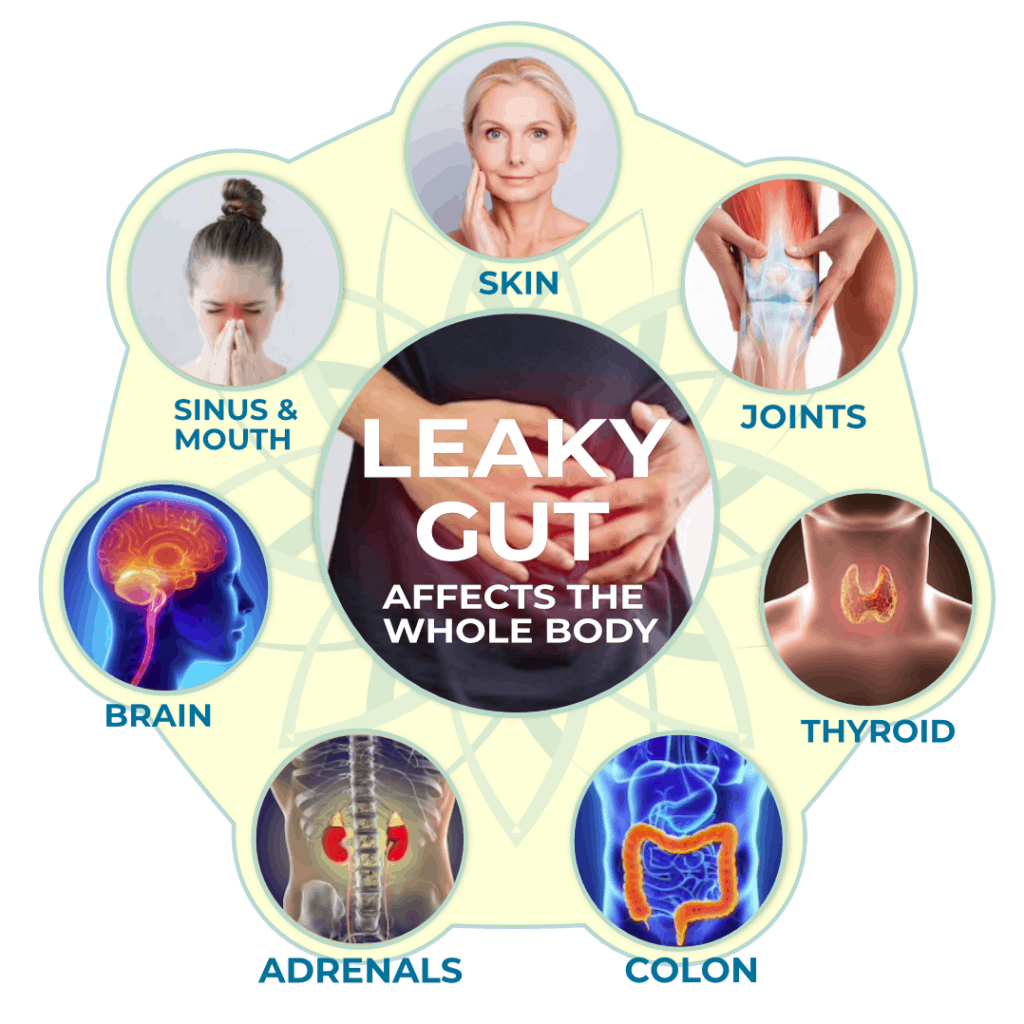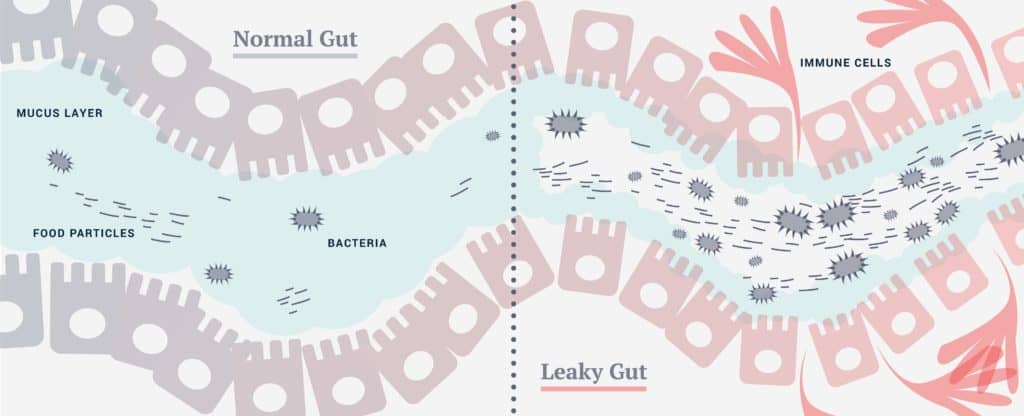You may have heard the term leaky gut before or you may even be experiencing its symptoms but not understand the origins. As interesting as it sounds, leaky gut syndrome is now a common term used to describe the dysfunction of your stomach’s internal membrane which dictates the absorption of nutrients and at the same time the removal of toxins. Think of your gut lining like a computer systems firewall. The firewall protects your computer from viruses and malware, while allowing your computer to function properly without unnecessary interference. That is a very simple analogy for a much more complex system that operates within your body.

Many people rush to probiotics to help fix this issue but without healing your gut membrane first. This approach may be futile and a waste of your money spent on probiotic supplements. Leaky gut can negatively affect the good bacterial flora in your stomach as without a properly functioning “firewall”, your probiotics may be wasted and pathogenic toxins and bacteria may end up dominating your gut. This is where problems may happen.
Flooding your gut with probiotics isn’t the answer and isn’t a sustainable health solution. If your gut permeability is compromised you can not only be letting the “bad guys” in, but also leaking the “good guys” out. That clearly isn’t the goal of replenishing your intentional flora.
The solution is to heal your gut first and then replenish your healthy bacterial flora. This can be accomplished with natural organic acids called fulvic and humic acids. These two plant-based acids give your stomach a 1-2 punch (not literally) by first healing the gut lining and then replenishing and nourishing your natural bacterial flora. This is clearly the best viable solution if you want to have long-term and sustainable health benefits.
So what else does leaky gut cause beyond your stomach?
When foreign substances enter your bloodstream a lot of bad things can happen. You may develop autoimmune issues, allergic reactions and experience problems like irritable bowel, migraines, food allergies, chronic fatigue, rheumatoid arthritis, and eczema. Unfortunately it doesn’t just stop there, over time the damaged cells in your gut can fail to produce the essential enzymes needed for proper digestion. This can further lead to nutritional deficiencies that trigger a weakened immune system and make you vulnerable to all sorts of viruses and infections.
Signs That You Have a Leaky Gut
Dysfunctional intestinal permeability can lead to chronic fatigue syndrome, allergies, autoimmune diseases, and even depression. For overall health, it is important to be familiar with the signs of a leaky gut and to seek solutions in a timely fashion. Like many conditions, the earlier you catch and treat them the better it is long-term so they do not become chronic and pose serious health risks. Counterintuitively, some of these signs may not even be noticed directly in the digestive system so it’s important to recognize the signs that occur outside of the stomach.
Here are some of the most common signs you may have if you are suffering from leaky gut syndrome.
Digestive Issues
You are likely to experience several digestive problems when you have compromised intestinal permeability. You may develop several nutritional deficiencies because of a leaky gut. The most common are calcium, magnesium and vitamin B12 deficiencies. Your body can also fail to produce enough digestive enzymes, which will directly affect digestion of food. To prevent possible deficiencies, many healthcare providers may prescribe a multivitamin. Unfortunately most of these store bought “multis” only contain inorganic vitamins and minerals that are chemically synthesized in a lab. Fulvic acid has been shown to transmutate (the change of one substance into another) inorganic minerals into bioavailable minerals that can be used by your body as well as increasing the production of valuable enzymes in your digestive system.
Food Sensitivities and Allergies
Many food sensitivities and even allergies may indicate a problem with your gut health. Your body may be triggered to release antibodies and histamines due of foreign substances that leak into your bloodstream. Your body thinks it’s under constant attack and sends your immune system into an overactive spiral. This can make you more susceptible to antigens found in some foods, such as dairy and gluten. Many studies have found a direct link between food allergies and leaky gut. It means that if you have severe food allergies and you cannot seem to pinpoint the cause, it could be because you have leaky gut syndrome.
Inflammatory Bowel Disease (IBD) and Irritable Bowel Syndrome (IBS)
If you have been diagnosed with inflammatory bowel disease, you are very likely to have a leaky gut and conversely, if you have leaky gut it is possible to develop IBD. Inflammatory Bowel Disease (IBD) refers to diseases such as Crohn’s and ulcerative colitis (UC) which are the two most common forms. These diseases affect the gut, but ulcerative colitis largely affects the colon. Irritable bowel syndrome (IBS) refers mainly to the symptoms caused by these diseases, but IBS can affect people even without chronic conditions. IBS is becoming more common due to today’s modern stressful lifestyle and low nutrient density foods with symptoms ranginging from bloating and gas to severe pain and diarrhea. Fulivc acid contained in AEON has been scientifically demonstrated to lower inflammatory responses which can help mitigate symptoms.
Autoimmune Conditions
Autoimmune conditions are directly linked to chronic inflammation, which can then turn into autoimmune diseases. When your body, organs or even joints get exposed to chronic inflammation your body sends out its helpers. The problem occurs when these helpers start overreacting and start to turn on you and attack your system. These once beneficial “helpers” then become attackers and it then becomes hard for your body to distinguish the “good guys” from the “bad guys”. It becomes a vicious circle, but there are solutions.
Autoimmune diseases such as rheumatoid arthritis, alopecia, lupus, multiple sclerosis, chronic fatigue syndrome, ulcerative colitis, thyroiditis, vitiligo, Sjogren’s syndrome, and Raynaud’s syndrome are all linked to chronic inflammation. It is important to keep in mind that if you have these diseases you need to work with your doctor to not only treat the symptoms, but find a solution to heal the lining of the GI tract.
The University of British Columbia has released a breakthrough scientific abstract [URL??] that has identified that fulvic acids derived from Canadian sources such as AEON have massive therapeutic potential to treat these conditions. Further scientific studies are planned and the parent company of AEON, INVIKTVS Scientific Innovations, are in discussions with several universities such as UBC to form joint partnerships to further this research and plan to share their findings with the scientific community.
Skin Problems
Science has identified what is called the “gut-skin-axis” or the “gut-skin-microbiome” and has confirmed that leaky gut can be the cause of a variety of common skin conditions. Skin flare ups such as acne, eczema, psoriasis and persistent rashes are likely due to toxins entering your bloodstream from compromised gut permeability.
Another major factor to be considered is the unbalance of a healthy bacterial flora in your gut. Although probiotic supplements could be part of the solution, it is important to understand that there are thousands of strains and it is difficult to determine which strains are actually beneficial and the strains that can exacerbate the problems. To further complicate things, common probiotic supplement strains have been shown to cause inflammation which is obviously counterproductive.
Current drugs and topical treatments to correct these skin conditions are usually an unsuccessful long-term strategy because you need to fix the underlying causes that might exist in your gut. Many of these drugs and creams only provide a temporary solution and do not do much to correct the root causes.
Fulvic acid holds promise in several areas of skin health and skin care both as a nutritional health supplement and as a topical treatment. Many scientific studies demonstrate that this natural organic acid can not only heal your skin from the inside, but also has healing effects when used topically. Move over hyaluronic acid, fulvic acid is the new kid on the block.
Metabolism Problems
Your metabolism is slowing down, you’re putting on weight and you may think you are just getting older. The truth is you may develop several thyroid related issues if you suffer from leaky gut syndrome. Many people may develop chronic thyroiditis which is also called Hashimoto’s disease. This can lead to impaired metabolism, low thyroid function, depression, fatigue, weight gain, and a number of other problems.
Mood Disorders
Science has identified what they call the “gut-brain-axis” and the “gut-brain-microbiome”. This is the interrelationship between the gut and the brain or how the gut and brain communicate with each other. Many people with leaky gut syndrome may experience mood disorders and other neurocognitive issues. Leaky gut may trigger an inflammatory response that increases the release of cytokines and many other pro-inflammatory chemicals that put you at an increased risk of developing clinical depression. If you have depression along with other signs of a leaky gut, you should talk to your medical professional to manage your condition properly.
Neurocognitive Disorders
Autism is on the rise and some studies suggest that leaky gut syndrome may play a role in the onset of autism. Many experts believe that serious problems in the gut microbiome in the first year of life could increase the risk of developing autism. Modern science has also demonstrated that there is a relationship between autism and compromised gut permeability because the toxins released into the bloodstream may cause a chronic inflammatory response and may directly affect the production of neurochemical compounds and their absorption. This can have a devastating impact on neurocognitive health especially during the formative years of the brain.
The takeaway here is probiotics alone aren’t the total solution. You need to heal the gut lining first before these healthy bacteria can provide any lasting effects. It is a 2-step approach, heal your lining first and then nourish your natural bacterial flora (or introduce new strains through probiotics supplements).
AEON is an NHP (natural health product) that uses proprietary humic and fulvic acids derived from Canadian sources. These are the exact organic acids that have been studied for their benefits on healing the gut membrane and nourishing your natural bacterial flora.




